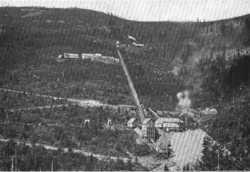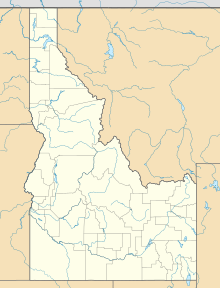Hercules silver mine facts for kids

1904 image of the Hercules Silver Mine, Idaho
|
|
| Location | |
|---|---|
| Location | Silver Valley (Idaho) |
| State | Idaho |
| Country | United States |
| Coordinates | 47°32′33″N 115°48′36″W / 47.5425°N 115.81°W |
| Production | |
| Products | Silver, Lead, Zinc, Copper, Gold, Nickel |
| Type | Underground |
| History | |
| Opened | 1901 |
| Active | 1901-1925, 1930-1931, 1934-1935, 1937-1938, 1941, 1945-1960, 1962, 1964-1965 |
| Closed | 1965 |
The Hercules Mine was a very rich mine in the Coeur d'Alene Mountains in Burke, Idaho. It was famous for producing large amounts of lead and silver.
The mine was discovered in 1889 by Harry L. Day and Fred Harper. Harry Day was a bookkeeper, and Fred Harper was a local prospector.
Other important people who invested in the mine included August Paulsen, Levi Hutton, and May Arkwright Hutton. The mine later became a main part of the Hecla Mining Corporation. In 1923, the mine owners started a company called Day Mines, Inc..
Contents
Discovery and Operation
Harry Day and his partners found valuable silver-lead ore on June 2, 1901. This discovery led to the mine's official opening. The Hercules Mine began its main operations in 1901. It was a very successful mine for many years. The mine eventually closed down in 1965.
People Behind the Mine
Many of the original owners of the Hercules Mine had interesting backgrounds. They were often involved in the early labor movements. These movements worked to improve conditions for miners.
Levi "Al" Hutton
Levi "Al" Hutton was an engineer. He was involved in moving explosives by train. He later became an important investor in the Hercules Mine.
May Arkwright Hutton
May Arkwright Hutton was a writer and activist. She wrote a book called The Coeur d'Alenes: or, A Tale of the Modern Inquisition in Idaho. This book talked about the difficult lives of miners. It also described how mine owners treated them. After the Hercules Mine became very successful, she bought back copies of her book.
Ed Boyce
Ed Boyce was another early investor in the mine. He was the president of the Western Federation of Miners in 1899. This was a union that supported miners' rights. After the Hercules Mine brought him great wealth, he left his union job. He then opened a fancy hotel.
Labor Disputes and the Mine
One early owner of the Hercules Mine was a man named Albert Horsley, also known as Harry Orchard. He later became involved in a major historical event.
There was a big labor dispute in the area. During this time, a special law called martial law was put in place. Harry Orchard felt he unfairly lost his share of the Hercules Mine because of this. Some people believed this made him very upset. This dispute over his mine share became a part of larger discussions about labor rights and fairness in the mining industry.
 | Stephanie Wilson |
 | Charles Bolden |
 | Ronald McNair |
 | Frederick D. Gregory |


